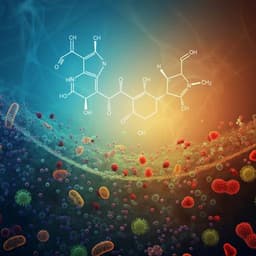
Health and Fitness
Resistant starch intake facilitates weight loss in humans by reshaping the gut microbiota
H. Li, L. Zhang, et al.
The study investigates whether resistant starch (RS), a fermentable dietary fiber, can facilitate weight loss and improve metabolic health in individuals with excess body weight by reshaping the gut microbiota. Prior research indicates the gut microbiota regulates inflammation, fat storage and glucose metabolism, and that diet can modulate the microbiome. While fecal microbiota transplantation has shown inconsistent benefits in obesity, dietary manipulation of the microbiome with prebiotics is a promising strategy. RS reaches the colon undigested, where it is fermented by microbes, and animal studies suggest RS reduces adiposity; however, prior human trials often did not observe weight loss, potentially due to high-fat diets or poor dietary compliance attenuating RS fermentation. This study aims to rigorously test RS’s impact on obesity-related outcomes under a controlled, balanced diet and to establish causal links and mechanisms via multi-omics and gnotobiotic animal models.
The authors summarize evidence that gut microbiota influences host metabolism, including inflammation, adiposity, and glucose homeostasis. Prebiotics enrich beneficial taxa (e.g., Bifidobacterium, Lactobacillus) and improve gut barrier function and inflammation, but many studies lack causal mechanistic links. RS in rodents reduces visceral fat and improves metabolic outcomes, especially under low-fat diets; high-fat intake attenuates RS fermentation and benefits. Previous human studies with RS (4–12 weeks) improved insulin sensitivity without consistent weight loss, likely due to diet composition and adherence issues. Combining dietary intervention with microbiota modulation (e.g., FMT) can improve outcomes. The authors highlight a need for controlled feeding trials in humans with multi-omics integration and mechanistic validation in animal models to clarify RS’s therapeutic potential and dose-response for obesity treatment.
Design: Placebo-controlled, double-blind, randomized crossover clinical trial (ChiCTR-TTRCC-13003333) in Shanghai, China (2013–2016). Participants (n=37; 22 men, 15 women; mean age 33.4±7.7 years) had BMI ≥24 kg/m² and/or increased waist circumference; exclusions included recent antibiotics/probiotics, diabetes, thyroid disease, corticosteroids, or other trials. Interventions: Two 8-week periods separated by a 4-week washout. RS period: high-amylose maize resistant starch type 2 (HAM-RS2) delivering 40 g/d RS (2.8 kcal/g; 91.2 g powder per day). Control period: energy-matched amylopectin control starch (AMIOCA; 3.55 kcal/g; 72 g/d; 0 g RS). Sachets taken twice daily before meals. Order randomized (RS→Washout→CS or CS→Washout→RS). All participants received an isoenergetic, balanced background diet (50–60% carbohydrate, 25–30% fat, 15–20% protein) with controlled calories and dietician monitoring. Compliance and adverse events recorded (no significant GI side effects reported). Outcomes and assessments: Primary outcome: body weight. Secondary: fat mass, waist circumference, visceral and subcutaneous fat areas by MRI, insulin sensitivity by hyperinsulinemic-euglycemic clamp (GIR), meal tolerance test (glucose and insulin), inflammatory cytokines (TNFα, IL-1β, IL-6, IL-10, MCP-1), adiponectin, ANGPTL4, FGF21, serum and fecal lipids (NEFA, TG, TC). Multi-omics: shotgun metagenomics (subset n=27 RS, n=16 CS paired), untargeted serum metabolomics, targeted bile acids, and targeted SCFAs (serum and feces). Statistical analyses: linear mixed models adjusted for intervention order, with Bonferroni correction; NMDS/Bray-Curtis for microbiome dynamics; Wilcoxon tests with BH FDR; generalized linear models with AIC-based model averaging to associate species with phenotypes; PLS-DA for microbe-metabolite associations. Animal studies: Fecal microbiota transplantation (FMT) from selected human donors post-RS or post-CS (n=4 donors/group) into antibiotic-treated C57BL/6J male mice fed a Western diet; outcomes: body weight, fat depots (iSAT, eWAT, pWAT, mWAT), adipocyte histology, energy expenditure/activity/food intake, GTT, serum adiponectin. Mechanisms: gut permeability (DX-4000-FITC), ileal tight junction proteins (ZO-1, occludin; mRNA and immunofluorescence), LPS in serum and mWAT, ileal ANGPTL4 expression, luminal lipase activity, ileal and fecal TG, serum ANGPTL4. Probiotic intervention: conventionally raised WD-fed mice received drinking water with live Bifidobacterium adolescentis, heat-killed B. adolescentis, or saline for 5 weeks; outcomes as above plus qPCR for B. adolescentis, ANGPTL4 IHC, and FGF21 sensitivity testing (FGFR1/KLB/EGR1 expression, ERK1/2 phosphorylation). Germ-free study: male GF mice fed C35 diet (45% fat, 20% protein, 35% carbohydrate with 20% RS or 20% CS; remainder maltodextrin) for 10 weeks, gavaged with PBS or live B. adolescentis for 8 weeks; outcomes: disemboweled body weight, body composition, GTT/ITT, gut permeability, tight junctions, mWAT inflammation, ileal ANGPTL4, luminal lipase activity, ileal/fecal TG. Metabolomics in mice: targeted serum bile acids, fecal SCFAs, and serum branched-chain amino acids. Ethics approvals and assay details provided.
Clinical trial: Compared with control starch (CS), 8 weeks of RS led to significant weight loss and adiposity reduction: net absolute change in body weight −2.81 kg (95% CI −3.55 to −2.07; P<0.001); BMI, fat mass, waist circumference decreased; visceral fat area and subcutaneous fat area decreased (P<0.001 and P=0.004, respectively). Improvements were evident from week 2. Insulin sensitivity improved: glucose infusion rate (GIR) increased (median +1.05 mg kg⁻¹ min⁻¹ [0.15 to 2.10] vs CS; P=0.025). Glucose tolerance improved; 120-min insulin during meal tolerance test was lower after RS. Inflammation decreased: serum TNFα and IL-1β were lower (P=0.014 and P=0.046). Lipid absorption markers: daily fecal NEFA, TG, and total cholesterol excretion increased after RS; no difference in fat intake between periods. ANGPTL4 increased and FGF21 decreased after RS. Microbiome and metabolites: RS restructured gut microbiota dynamics (NMDS separation; Adonis P<0.001). Species increased with RS: Bifidobacterium adolescentis, B. longum, Ruminococcus bromii; decreased: Alistipes putredinis, Bacteroides vulgatus, Odoribacter splanchnicus, Parabacteroides merdae (FDR thresholds reported). B. adolescentis strongly associated with lower BMI, waist circumference, VFA, and higher ANGPTL4; R. bromii increases associated with higher GIR. Baseline B. adolescentis positivity predicted greater fat mass reduction and ANGPTL4 increase with RS. Serum bile acids: GDCA significantly increased with RS; GDCA and TDCA changes negatively correlated with obesity metrics and positively with insulin sensitivity and ANGPTL4; linked positively to B. adolescentis, B. longum, Dorea longicatena, and R. bromii. Community BSH gene abundance decreased with RS and correlated with B. vulgatus. Fecal isobutyrate and valerate decreased with RS; circulating SCFAs unchanged. Causality/mechanisms in mice: FMT from RS-period donors reduced body weight, fat mass, and adipose depot percentages; adipocytes were smaller; energy expenditure, activity, and intake were unchanged; glucose tolerance improved; serum adiponectin increased. RS-altered microbiota reduced systemic and adipose inflammation (MCP-1, IL-1β, IL-6 down; IL-10 up), decreased gut permeability (lower serum FITC-dextran), increased ileal tight junction proteins (ZO-1, occludin), lowered LPS (serum and mWAT), increased ileal and serum ANGPTL4, reduced intestinal luminal lipase activity, lowered ileal TG, and raised fecal TG, indicating reduced lipid absorption. B. adolescentis experiments: Supplementation with live B. adolescentis (but not heat-killed) attenuated WD-induced weight gain and adiposity, increased ileal ANGPTL4 expression and secretion, reduced luminal lipase activity, decreased ileal TG and increased fecal TG, and elevated serum ANGPTL4. B. adolescentis shifted bile acids (increased DCA and GCA in GF mice; increased TLCA in SPF mice; decreased primary bile acids TBMCA, TCDCA, TCA), reduced fecal isobutyrate and valerate, and decreased serum BCAAs (valine, leucine). B. adolescentis enhanced adipose FGF21 sensitivity (higher FGFR1/KLB/EGR1 expression and ERK1/2 phosphorylation; lower LPS/CD14/TLR4). Germ-free study: RS did not reduce disemboweled body weight or improve glucose/insulin sensitivity in GF mice vs CS. RS plus B. adolescentis significantly reduced disemboweled body weight and fat mass, improved GTT/ITT, reduced gut permeability and inflammation, increased ileal ANGPTL4, lowered luminal lipase activity and ileal TG, and increased fecal TG. These results indicate RS’s metabolic benefits require the microbiota and are mediated at least in part through B. adolescentis.
The study demonstrates that under a controlled, balanced diet, RS (40 g/day, type 2) produces clinically meaningful weight loss and improves insulin sensitivity in individuals with excess body weight, addressing inconsistencies in prior human RS studies. Multi-omics data link these benefits to specific microbiota restructuring, notably increases in R. bromii (a primary RS degrader) and B. adolescentis, with the latter strongly associated with reductions in BMI and visceral adiposity and higher ANGPTL4. Metabolite profiling supports a mechanistic axis involving bile acids: RS increased GDCA and trends in other secondary and conjugated bile acids that associate with improved adiposity and insulin sensitivity, potentially via FXR/TGR5 signaling; reduced community BSH gene abundance may contribute to bile acid shifts. Functional validation shows that RS-modified microbiota is sufficient to reduce adiposity and improve glucose metabolism in mice, via restoration of intestinal barrier integrity (higher ZO-1/occludin, lower LPS), dampening low-grade inflammation, and inhibition of intestinal lipid digestion/absorption through ANGPTL4-mediated suppression of lipase activity, leading to increased fecal lipid loss. B. adolescentis alone recapitulates key effects, including enhancing intestinal ANGPTL4 and adipose FGF21 sensitivity. Germ-free experiments establish that RS requires microbiota to exert benefits and that B. adolescentis is a key mediator. Collectively, RS facilitates weight loss through microbiota-dependent modulation of bile acids, gut barrier function, inflammatory tone, ANGPTL4-regulated lipid absorption, and FGF21 signaling.
This work establishes that an 8-week supplementation with resistant starch type 2 (40 g/day), alongside an isoenergetic balanced diet, facilitates weight loss and improves insulin sensitivity in adults with excess body weight. RS reshapes the gut microbiota, enriching Ruminococcus bromii and Bifidobacterium adolescentis; microbiota alterations correlate with favorable bile acid profiles and host phenotypes. Causality is supported by FMT and B. adolescentis supplementation experiments, which reveal mechanisms involving improved gut barrier integrity, reduced inflammation, inhibition of intestinal lipid absorption via ANGPTL4, and enhanced FGF21 sensitivity in adipose tissue. The efficacy of RS depends on the presence and composition of the microbiota, with B. adolescentis acting as an important effector. Future research should validate these findings in larger and more diverse cohorts, incorporate strain-level and metagenome-assembled genome analyses, dissect bile acid–microbiota crosstalk and receptor signaling, and explore personalization based on baseline microbiota (e.g., B. adolescentis status) and long-term adherence strategies to maintain microbiome composition and weight loss.
The clinical sample size was modest with strict inclusion criteria, potentially limiting generalizability. The metagenomic analysis was database-dependent and taxon-based, which may discard unclassified sequences and overlook strain-level functional diversity; integrating metagenome-assembled genomes could improve biomarker discovery. Results require validation in larger, more diverse populations, with attention to individual microbiota dynamics and functional responses to RS. The study’s crossover washout showed weight regain, highlighting challenges in long-term maintenance. While multi-omics and animal models support causality, human mechanistic endpoints (e.g., direct measures of intestinal ANGPTL4 activity) were inferred rather than directly measured.
Related Publications
Explore these studies to deepen your understanding of the subject.







